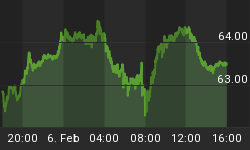When investors decide to close out their riskier positions and move into "cash", they don't actually go to the bank and get a stack of twenties. Most just sell their stocks and let their broker sweep the proceeds into a money market fund which, they assume, is the same thing as cash because it holds high-quality short-term commercial paper that almost never defaults.
That pleasant assumption breaks down as soon as you look at a typical money market fund's holdings and see that it owns, among other disturbing things, a lot of European bank debt.
But at least you can get your money out with a mouse click, right?
Well, maybe not. Apparently the Fed, cognizant of the potential weakness of the money fund system, is considering withdrawal limits:
Fed Eyes Limiting Money-Market Fund Withdrawals
NEW YORK - The Federal Reserve Bank of New York said it supports limiting some types of money-market fund withdrawals in a bid to protect those funds from suffering the equivalent of a bank run.
The recommendations came from a staff report released Thursday. New York Fed President William Dudley in a press release accompanying the document said he "strongly" endorses the ideas put forth by authors Patrick McCabe, Marco Cipriani, Michael Holscher and Antoine Martin.
"Further reform of money funds is essential for our nation's financial stability," Mr. Dudley said.
The analysts propose that money-market funds could be strengthened if they were to have a "minimum balance at risk." As envisaged by the authors, this balance "would be a small fraction of each shareholder's recent balances that would be set aside in the event that they withdrew from the fund," the press release said.
While regular transactions would be allowed as they are now, this special minimum balance would be locked up for 30 days. "The delay would ensure that redeeming investors remain partially invested in the fund long enough to share in any imminent portfolio losses or costs arising from their redemptions," the bank explained.
The idea advanced in the New York Fed paper seeks to force investors to be more mindful of what they are doing with money-market fund investments. Many perceive the funds to be a very safe and liquid place to park funds. But that notion was tested during the 2008 financial crisis, and some have worried that in the current environment, money-market funds could be a prime conduit for importing Europe's ongoing financial crisis to the U.S.
Money-market funds currently hold some $2.7 trillion in assets, according to the paper. They own, as of late 2011, around 40% of all dollar-denominated commercial paper, the New York Fed said.
The report provides fodder for Securities and Exchange Commission Chairman Mary Schapiro as she inches her divided agency toward a vote as early as this summer on a proposal to strengthen money-fund regulations. SEC officials described the New York Fed paper as a "blueprint" for the changes Ms. Schapiro would like to make.
Ms. Schapiro, joined by Federal Reserve and Treasury Department officials, sees money funds as one of the weakest links in the financial system despite reforms adopted two years ago to make the industry more resilient to widespread redemptions. Fund firms and other experts say the cash-like investments rarely run into serious trouble.
To publicly float her proposals, Ms. Schapiro needs "yes" votes from two of her four fellow commissioners. For months, three of the commissioners have said they don't believe there is sufficient evidence additional money-fund overhauls are needed, effectively blocking the proposals' advancement.
A number of Fed officials have been anxious about money-market funds for some time. Central bankers see the funds as a prime source of risk in large part because their structure is such that when trouble, or the fear of trouble, arises, investors have every incentive to withdraw all their funds. That can create the equivalent of a bank run.
In congressional testimony Wednesday, Fed Chairman Ben Bernanke said money-market funds are currently a potential source of financial-market instability. He expressed his support of regulators' attempts to lower the source of risk posed by money funds.
Some thoughts
In a healthy society lots of things can be legitimately seen as risk-free, starting with a sound currency and moving through the financial instruments based on that currency and administered by well-capitalized and sensibly-regulated banks.
In an unhealthy society fewer and fewer things are risk-free. The banks can no longer be trusted to survive, governments run out of money, and even the currency stops functioning as a store of value.
Currency risk and market instability go hand-in-hand, with each amplifying the volatility of the other. So along with inflation-induced booms and busts comes an increase in the incidence of capital controls, where panicked governments limit citizens' and foreign investors' ability to move wealth around. The Fed's proposed money market fund rules are both a perfect example of this and a sign of things to come. Once the crisis really gets going, expect controls to be imposed on bank accounts and international funds transfers initially, and from there who knows. Maybe IRAs and 401(K)s?
If history is any guide, by the end of this process gold will be the only remaining risk-free asset, and its value in debased fiat currency terms will be astronomical.















